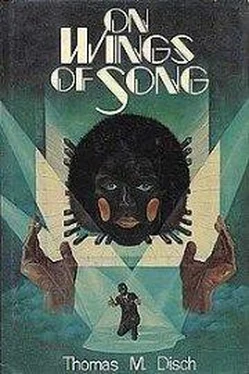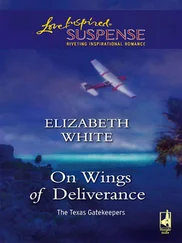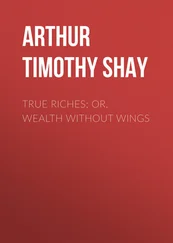“It’s not pretty where we’re headed,” he cautioned. “But it keeps her going.”
Miss Marspan made no reply.
Daniel parted the curtain to see how far they’d come. What he could see looked like any part of Queens he’d ever been to: there was the wide, untrafficked highway lined on either side by junked-out cars and overturned trucks, a few of which gave signs of being inhabited. Farther back from the road were the blackened shells of single-dwelling houses. It was hard to believe that away from the highway there were still large areas of Queens that had been left unblighted. He let the curtain fall closed. The taxi swerved, avoiding something in the road.
He could make a break for it now, he supposed. He could go and live among those ruins, there to be ruined himself. But that would have meant surrendering Boa to her father, an act he could not, would not be driven to. It had been his whole pride, the source of all his self-respect, that he had, by privations great and small, by the daily indignities of these twelve years, been responsible for Boa’s maintenance ( well-being would be stretching it). Other men have families. Daniel had his wife’s corpse (for such she was now, legally) to sustain him. But it served the same purpose: it kept him from believing, despite every other evidence, that his defeat was final, whole, and entire.
Once, he’d known why he was doing this, and why he must persevere. Fear moved him. But that fear had come, in time, to seem unfounded. Grandison Whiting might be a selfish man, but he was not insane. He might have judged Boa in error in taking Daniel as her spouse, he might have wished Daniel dead, he might even have arranged that to happen, other persuasions failing — but he wouldn’t have murdered his daughter. However, as the specific fear had diminished there had come in its stead a distaste for Whiting, and all his works and wiles, that mounted finally to horror.
He had no rationale for his aversion. In part it was simple class feeling. Whiting was an arch-reactionary, a Machiavelli, a Metternich, and if his reasons for it were more intellectual than most such sons-of-bitches’ reasons, even (Daniel had to admit) more persuasive, that only made him a more dangerous son-of-a-bitch than most. There was a religious side to it too, though Daniel resisted the idea of his having any connection whatever with religion. He was a no-nonsense, cut-and-dried, self-justified atheist. Religion, in the words of his friend Claude Durkin, was something you had to learn about in order fully to appreciate the Old Masters. But the book he’d read way back when in Spirit Lake had got a hold on Daniel, and the Reverend Jack Van Dyke’s blithe paradoxes had wormed their way into his mind, or will, or whatever corner of the soul it is that has faith in things unseen. There, in the darkness where no rational contradiction could touch it, the idea grew, and ramified, that Grandison Whiting was one of those Caesars whom Van Dyke had written of, who rule the world and unto whom there must be renderings, despite that they are savage, corrupt, and conscienceless.
In short, distance had turned Grandison Whiting into an idea — an idea that Daniel was determined to resist in the one way given him to do so: by refusing him the possession of his daughter’s twelve-years-comatose body.
Ward 17, where the corpse (as it was, in the eyes of the Law) of Boadicea Weinreb was to be found, occupied only a small part of the third sub-basement of the annex of First National Flightpaths. After Daniel had signed in at the desk in the lobby, and after Miss Marspan had, under protest, checked her pistol with the guard outside the elevator, they were allowed to go down to the ward unescorted, for Daniel’s was a familiar face at the annex. They walked down a long reverberating tunnel lighted, now harshly, now dimly, by irregularly spaced tubes of neon mounted on the broad low arch of the ceiling. On either side of them, spaced with the tight, terrible regularity of markers in a cemetery, lay the inert and weakly respiring bodies of those who had never returned from their flights into the spaces beyond their flesh. Only a few of the hundreds in this one ward would ever resume a corporeal life, but the husks lingered on, aging, withering, until some vital organ finally failed, or until the accounting office sent down the order to disconnect the life-supporting machineries, whichever came sooner.
They stopped before Boa’s cot, a kind of rubber sling suspended from a tubular frame.
“The name…” Miss Marspan observed, stooping to read the chart fixed to the foot of the bed. The sights of the ward had robbed her of her usual decisiveness. “Bosola? There’s some mistake.”
“It was the name we registered under, when we came here.”
Miss Marspan closed her eyes and laid her gloved hand lightly over them. As little as he liked the woman, Daniel could not but feel some sympathy for her. It must have been hard to accept this shriveled chrysalis as the niece she’d known and loved, so far as love was in her nature. Boa’s skin was the color of grimed light-bulbs of frosted glass and seemed, stretched tight across each prominence of bone, as brittle. All fullness was wasted, even her lips were thin, and the warmth you could detect in her hollow cheeks seemed borrowed from the humid airs of the tunnel and not her own. Nothing spoke of life or process except the plasma oozing through translucent tubes into the slow-revolving treadmill of her arteries and veins.
Miss Marspan squared her shoulders and made herself approach more closely. Her heavy skirts of pigeon-gray silk snagged on the frame of the cot adjacent to Boa’s. She knelt to loosen it, and remained a long while on one knee looking into the void of Boa’s face. Then she rose, shaking her head. “I can’t kiss her.”
“She wouldn’t know if you did.”
She backed away from Boa’s cot, and stood in the central aisle, looking about her nervously, but anywhere she turned the same sight was endlessly multiplied, row on row, body on body. At last she looked up, squinting, into the neon light.
“How long have you kept her here?” she asked.
“In this ward, five years. The wards on the upper floors are a bit cheerier, supposedly, but a lot more expensive. This is all I can afford.”
“It is a hell.”
“Boa’s not here, Miss Marspan. Only her body. When she wants to come back, if she wants to come back, she will. But if that isn’t what she wants, do you think a vase of flowers by the bed is going to make any difference?”
But Miss Marspan wasn’t listening to him. “Look, up there! Do you see? A moth.”
“Oh, there’s no harm in insects,” Daniel said, unable to repress his resentment. “People eat termites, you know. All the time. I used to work in a factory that mashed them up.”
Miss Marspan regarded Daniel with a level gaze; then, with the deliberated strength of a seasoned athlete, struck his face with the back of her gloved hand. Though he’d seen it coming and had braced himself, it was a blow to bring tears to the eyes.
When the echo had died out, he spoke out, not in anger but in pride. “I’ve kept her alive, Miss Marspan, think of that. Not Grandison Whiting, with his millions. Me, with nothing — I kept her alive.”
“I’m sorry, Daniel. I… appreciate what you’ve done.” She touched her hair to see that it was in place, and Daniel, in sarcastic mimicry, did the same. “But I don’t see why you don’t keep her with you, at home. Surely that would be cheaper than this… mausoleum.”
“I’m a temp, I don’t have a home. Even when I had a room at a hotel, it wouldn’t have been safe to leave her there alone. Rooms get broken into, and what would happen to anyone in Boa’s condition then—”
Читать дальше












